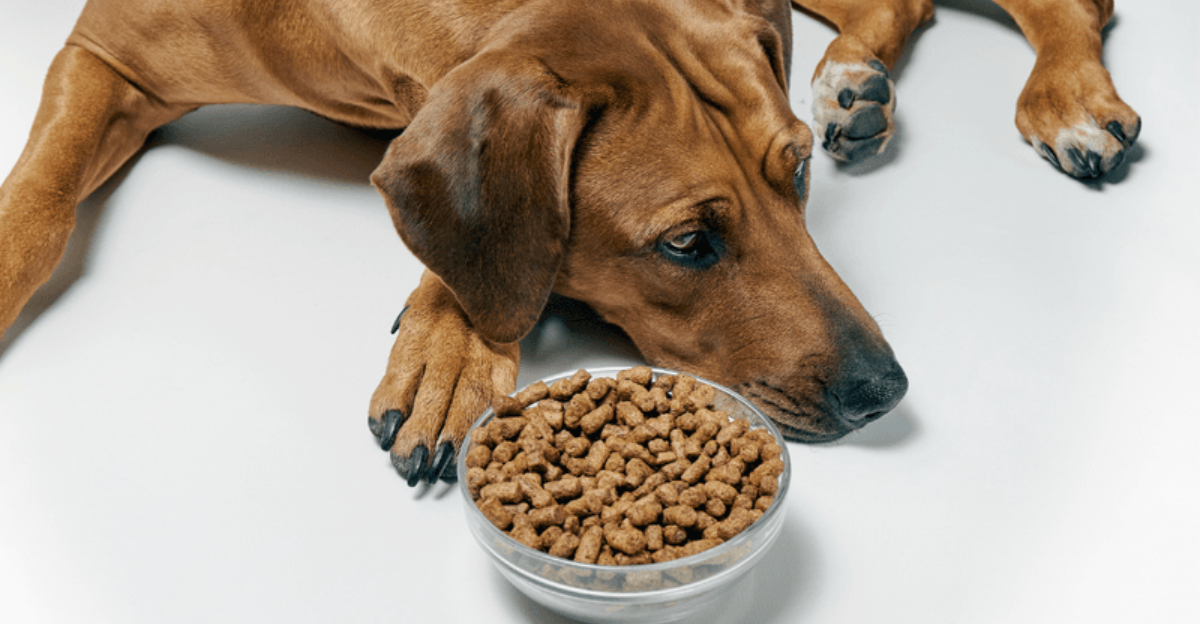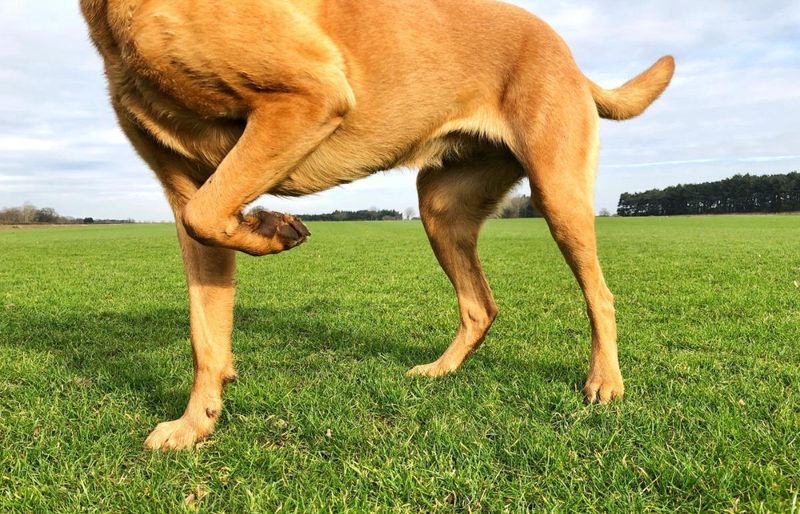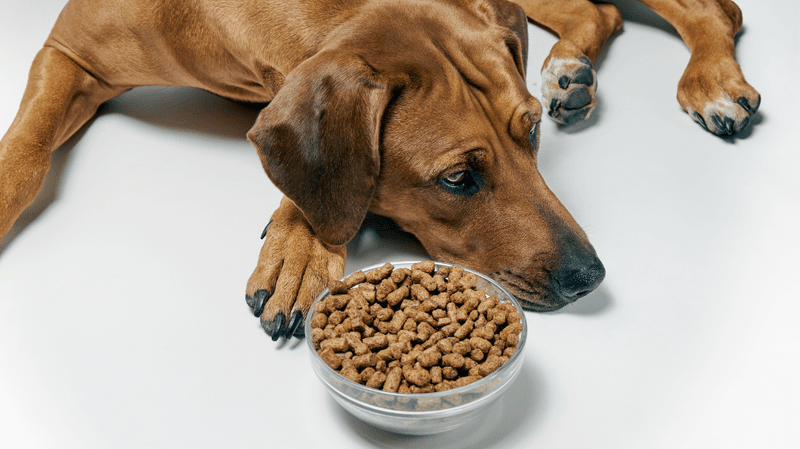Dogs are often considered family, and as responsible pet owners, it’s crucial to be aware of the warning signs that indicate your dog may need immediate veterinary attention. This guide covers 15 vital signs that should prompt a visit to the vet. From changes in behavior to physical symptoms, understanding these signals can make a significant difference in your dog’s health and well-being. Always remember, when in doubt, it’s better to consult your veterinarian.
Unexplained Weight Loss
Has your dog been losing weight despite eating normally? Unexplained weight loss can be alarming. It may indicate underlying health issues such as diabetes, cancer, or gastrointestinal problems.
In some cases, a hyperactive thyroid could be the culprit, especially in older dogs. Observing such rapid changes without a known cause should never be ignored.
Monitoring your dog’s eating habits and weight is essential. If you notice persistent weight loss, consult your vet immediately for a thorough examination. They can identify the root cause and provide the necessary treatment to restore your pet’s health.
Persistent Vomiting
Vomiting isn’t uncommon in dogs, but when it’s persistent, it signals trouble. Chronic vomiting could point to conditions like gastritis, pancreatitis, or even a blockage in the intestines.
If your furry friend can’t keep food down or appears lethargic, it’s time to take action. Dehydration is a risk, especially in smaller breeds.
Always observe the frequency and content of the vomit. If the issue persists beyond a day, seek veterinary care immediately to ensure your dog’s well-being. Prompt intervention can prevent potential complications.
Difficulty Breathing
Breathing difficulties can be frightening for both the dog and its owner. If your dog is wheezing, coughing, or showing signs of respiratory distress, it could signal heart disease, lung issues, or even allergies.
These signs are especially concerning if they appear suddenly. Dogs may also display blue-tinged gums, indicating lack of oxygen.
Immediate veterinary attention is essential in such cases. A proper diagnosis can determine the cause and the appropriate treatment, ensuring your beloved pet can breathe easy once more.
Excessive Thirst
Notice your dog drinking more water than usual? Excessive thirst, or polydipsia, can be a symptom of diabetes, kidney failure, or Cushing’s disease.
While it’s normal for dogs to drink more in hot weather or after exercise, constant increased consumption without a clear reason should raise concern.
Keep track of their drinking habits and consult your vet if the behavior continues. Early detection of the underlying issue can lead to more effective treatment and a better prognosis for your furry friend.
Sudden Collapse
Few things are more frightening than witnessing your dog suddenly collapse. This can indicate severe health issues like heart problems, heatstroke, or poisoning.
If your dog becomes unresponsive or has difficulty getting up, it’s a medical emergency. Immediate care is crucial to avoid life-threatening consequences.
Stay calm and gather any observable details about the situation to share with your vet. Quick action can save your pet’s life, providing them with the best chance for recovery.
Bloated Abdomen
A bloated abdomen is a red flag, especially in larger breeds. This condition, known as gastric torsion or bloat, can be life-threatening. Dogs may appear restless, have difficulty breathing, or even retch without producing vomit.
The stomach can suddenly twist, trapping gas and leading to shock. Observing these symptoms requires swift action.
Seek immediate veterinary assistance to prevent severe complications. Early intervention can make a difference between life and death in these critical scenarios.
Lameness or Limping
Lameness or limping can be more than a minor injury. It might signal arthritis, joint damage, or even a neurological disorder.
Observe if your dog favors one leg or seems to struggle when moving. These signs can develop gradually or appear suddenly after vigorous activity.
While minor injuries might heal on their own, persistent lameness deserves a vet’s attention. Proper diagnosis and treatment can alleviate your dog’s discomfort and prevent further complications.
Seizures
Witnessing a seizure is distressing, but it’s crucial to stay calm. Seizures can result from epilepsy, toxins, or metabolic disorders. Your dog might collapse, convulse, or foam at the mouth.
If your dog experiences a seizure, time the event and keep the area safe. Repeated episodes or clustering require immediate veterinary evaluation.
With proper care, the underlying cause can be managed, allowing your pet to lead a normal life. Don’t delay in seeking medical advice if seizures occur.
Persistent Diarrhea
Diarrhea can be messy, but when it persists, it raises concerns. It might indicate infections, dietary indiscretion, or even parasites.
Chronic diarrhea can lead to dehydration and nutrient deficiencies. Observing the frequency and consistency of the stools can provide clues to the underlying issue.
Consult your vet if diarrhea lasts more than a couple of days or is accompanied by other symptoms like vomiting or lethargy. Early intervention can prevent complications and restore your pet’s gut health.
Unusual Lumps or Bumps
Discovering lumps on your dog can be unsettling. While not all are harmful, some can indicate cancer or infections.
Regularly check your dog’s body for unusual growths. Pay attention to changes in size, shape, or firmness. Early detection can lead to successful treatment.
A vet’s evaluation is necessary to determine the nature of the lump. Biopsies or imaging might be required for a proper diagnosis. Your vigilance can make all the difference in your dog’s health.
Loss of Appetite
Has your dog’s food gone untouched? Loss of appetite can be a sign of illness or discomfort. It might suggest dental issues, infections, or emotional distress.
Observe your pet’s eating behavior and look for other symptoms like lethargy or weight loss. These can provide clues to the severity of the problem.
Consult your vet if your dog’s appetite doesn’t return. Timely intervention can identify the root cause and ensure your pet receives the care it needs.
Change in Behavior
Is your dog’s behavior out of character? Sudden aggression, withdrawal, or anxiety can signal health issues or emotional distress.
Some dogs may respond to pain or discomfort by becoming unusually quiet or irritable. Monitoring these changes is vital.
Discuss any sudden behavioral changes with your vet to determine the cause. They can provide guidance and treatment to restore your dog’s well-being.
Increased Scratching or Chewing
Is your dog scratching more than usual? Increased scratching or chewing can indicate allergies, skin infections, or parasites like fleas.
Persistent itching can lead to skin damage and secondary infections. Regular grooming and flea prevention are essential.
Visit your vet for a proper diagnosis and treatment plan if the issue persists. They can identify the cause and prescribe the appropriate medication or therapy to alleviate your pet’s discomfort.
Eye Discharge or Redness
Red or watery eyes are more than a cosmetic concern. They can indicate infections, allergies, or eye injuries.
If your dog’s eyes are red, swollen, or producing discharge, it requires attention. Left untreated, these issues can escalate into more severe conditions.
Consult your vet for an accurate diagnosis and treatment. They can recommend eye drops or other medications to restore your dog’s eye health.
Foul Odor
An unpleasant odor can be a sign of health issues. Dental disease, skin infections, or anal gland problems could be to blame.
Regular grooming and dental care are essential in preventing odor-causing conditions. If your dog still smells despite these measures, it’s time for a vet visit.
Identifying the source of the odor can prevent more serious health problems, ensuring your pet stays happy and healthy.















